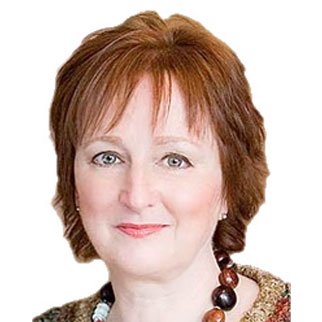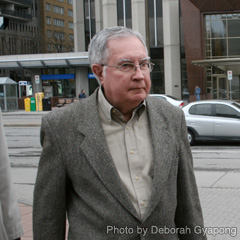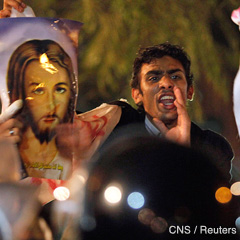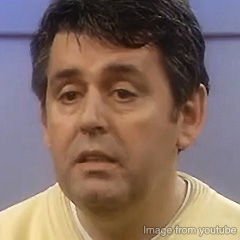
Deborah Gyapong, Canadian Catholic News
Deborah Waters Gyapong has been a journalist and novelist for more than 20 years. She has worked in print, radio and television, including 12 years as a producer for CBC TV's news and current affairs programming. She currently covers religion and politics primarily for Catholic and Evangelical newspapers.
OTTAWA - The retirement of two Supreme Court justices this summer gives Prime Minister Stephen Harper a chance to shape the court, but few expect he will appoint activist judges who will try to swing the court in a conservative direction.
Those on the front lines of court battles for religious freedom and moral issues prefer it that way. Catholic Civil Rights League president Phil Horgan, a Toronto-based lawyer, said he hopes Harper will choose justices who will interpret the existing laws and resist any temptation to make them.
“When you are acting as an umpire on competing claims, you try to make the best decision without overstepping the bounds of the judicial role,” he said. “It’s one thing to be the referee; it’s another thing to rewrite the rules of the game.”
Horgan wants judges that recognize the role of Parliament. For those who like an activist bench, he asks, “Are they prepared for the day when that activism doesn’t go in their favour?” He hopes the judges that will replace Justices Louise Charron and Ian Binnie are “cognizant of a healthy pluralism” in Canadian society.
Lahey’s sentencing hearing set for June 24
 OTTAWA - Bishop Raymond Lahey’s sentencing hearing will take place June 24, when the judge gets to hear testimony from a forensic psychiatrist.
OTTAWA - Bishop Raymond Lahey’s sentencing hearing will take place June 24, when the judge gets to hear testimony from a forensic psychiatrist.
Lahey, 70, pleaded guilty to importing child pornography May 4 and opted to go directly to jail rather than stay out on bail until a date could be arranged for Dr. James Bradford to testify about his psychological evaluation. A charge of distribution of child pornography was dropped.
The bishop faces a minimum one-year jail term, but he could receive a sentence as high as 10 years.
Student dies after explosion at Ottawa high school
OTTAWA - An explosion ripped through an auto shop at Ottawa's Mother Teresa Catholic High School May 26, killing Grade 12 student Eric Leighton, 18, and injuring five others.
Police reported the students had been cutting through metal making barbecues when residue in a 55-gallon drum exploded.
Leighton was found "without vital signs" at the scene but paramedics "initiated advance resuscitative measures" and by the time he reached hospital, he had regained a pulse. Leighton, however, died in hospital later in the day, according to police.
Paramedics assessed four other students and a 33-year old teacher at the scene. They were sent to hospital for monitoring of possible concussive injuries.
OTTAWA - The Supreme Court of Canada heard arguments May 18 in a religious freedom case that pits parental rights against Quebec’s mandatory Ethics and Religious Culture program (ERC).
The case was brought by a Roman Catholic couple from Drummondville, Que., who requested their two children be exempted from the ERC. Their name is protected by a publication ban.
Mark Phillips one of the two lawyers representing the parents, said the government insists the ERC is “about teaching tolerance and diversity.” The parents have nothing against those objectives, he said, but they say the course is “a form of indoctrination,” seeking to cultivate worldview and a framework for ethics that is different from their Catholic faith.
Co-counsel Mark Pratt told the court “the state has no right to program people” in arguing for the prior rights of parents to educate their children and to choose how that education is delegated. Many of the questions from the bench concerned whether the onus should be on the parents to prove harm, or whether the state had the onus to prove its course was neutral on religion.
OTTAWA — Bishop Raymond Lahey pleaded guilty to the importation of child pornography May 4 and went directly to jail after he asked the judge to be incarcerated while awaiting his sentence hearing.
The former Bishop of Antigonish, N.S., faced two child porn charges, but the Crown and defence counsel agreed to drop the more serious charge of possession of child pornography for the purpose of transmission. Lahey's lawyer told the court there was no distribution involved.
Lahey faces a minimum mandatory sentence of one year in jail and possibly up to 10 years.
He also faces dismissal from the clerical state, or defrocking as it was once known, from the Vatican. In a statement yesterday, the Vatican restated its condemnation of sexual exploitation in all its forms, particularly crimes against minors.
"Although the civil process has run its course, the Holy See will continue to follow the canonical procedures in effect for such cases, which will result in the imposition of the appropriate disciplinary or penal measures," said the statement.
OTTAWA - When the producer of the pro-life movie Bella saw a video of police handcuffing Ruth Lobo and four other students and pushing them into a police wagon, he wept.
Lobo, who heads up Carleton Lifeline, the university’s pro-life club, her fiancé James Shaw and three others were arrested for trespassing last fall on Ottawa’s Carleton University campus after trying to mount a Genocide Awareness Project (GAP) display of photographs comparing abortion to genocide.
“When I saw that officer just ignore the rule of law, I began to cry,” said Jason Jones, who spoke April 30 at a fundraiser for Lobo, Shaw and the Canadian Centre for Bioethical Reform at Notre Dame Cathedral. The Calgary-based pro-life organization created the GAP project
Jones produced the acclaimed film Bella, a small budget film that drew rave reviews when it was released in 2008. It also took the People’s Choice Award at the 2007 Toronto International Film Festival. The film tells the story of a young unmarried waitress fired from her job after she becomes pregnant and the cook who commits to helping her and ultimately convinces her to have the baby.
 OTTAWA - English-speaking Catholics helped ensure a Conservative majority in the May 2 federal election, but the historic surge in Quebec by the NDP signals a preference of state over church in French Canada.
OTTAWA - English-speaking Catholics helped ensure a Conservative majority in the May 2 federal election, but the historic surge in Quebec by the NDP signals a preference of state over church in French Canada.The NDP won a record-breaking 58 seats in Quebec, leaving the Bloc Quebecois with just four MPs, well below official-party status in the new Parliament. This triumph by the NDP “sends a signal that Quebeckers still strongly believe in the state” and put their focus on government rather than “the grassroots organizations of civil society,” said McGill University historian John Zucchi.
The Conservatives swept to a majority with 167 seats. The NDP will form the official opposition with 102 seats, compared to 34 Liberals, four BQ and one Green Party seat.
The anti-church trend in Quebec sets it apart from much of the rest of Canada. An Angus Reid poll released April 22 indicated 59 per cent of English-speaking Catholics who attend church weekly intended to vote Conservative. Half of other Catholics also said they would vote Conservative. Those preferences seemed to stand up on election day and reflected a trend identified in the last two elections in which the Liberals saw erosion of two main pillars of support: Catholic and ethnic voters.
Home front is battlefield for religious persecution fight
 OTTAWA - Prime Minister Stephen Harper’s promise to fight religious persecution abroad has won applause from religious freedom advocates, but some would like to see more attention paid to religious freedom on the home front.
OTTAWA - Prime Minister Stephen Harper’s promise to fight religious persecution abroad has won applause from religious freedom advocates, but some would like to see more attention paid to religious freedom on the home front.In Mississauga April 23, Harper told a diverse crowd that included many who came to Canada after fleeing religious persecution that he would establish an Office of Religious Freedom to ensure the defence of persecuted religious minorities remained a priority of foreign policy.
“While we are thankful in a country that spares us such tests, we must not let our comfort be an excuse to shirk our commitment to the cause of freedom,” he said.
Harper praised the memory of Shahbaz Bhatti, the Roman Catholic Pakistani minister of religious minorities who was assassinated March 2 for his defence of Christians unfairly targeted by that country’s blasphemy law.
“This is very good for the religious minorities of Pakistan and around the world,” said Peter Bhatti, the founder of International Christian Voice and older brother of the slain Pakistani minister. “This office will highlight and monitor the situation of what is happening to religious minorities.”
Liberal Leader Michael Ignatieff also supports taking on religious persecution on foreign shores.
Pain of Lahey trial could spark renewal
OTTAWA - When Bishop Raymond Lahey goes to trial on child pornography charges May 4, the anticipated news coverage will reopen wounds caused by the worldwide clerical sexual abuse, regardless of the trial’s outcome.
But observers say the pain provides an opportunity for needed renewal.
The former bishop of Antigonish was charged with possession and distribution of child pornography in October 2009. Lahey’s arrest followed the seizure of his laptop and other electronic equipment at Ottawa’s airport by a Canadian Border Service agent.
“The first thing is that a person is presumed innocent until proven guilty and we should not jump to conclusions,” said Fr. Frank Morrisey, a canon lawyer who has advised the Canadian Church on the clerical abuse crisis.
Ottawa priest’s ‘lifestyle’ prompts financial audit

OTTAWA - The Ottawa archdiocese confirmed it had launched an audit of the finances of Blessed Sacrament parish “some weeks” before two front-page stories appeared in the Ottawa Citizen April 16-17 raising questions about the lifestyle of its popular pastor.
The Citizen reported that Fr. Joe Le Clair had cash advances from the Lac-Leamy Casino across the Ottawa River in Quebec of more than $137,000 in 2009-2010, and incurred a credit card debt of more than $490,000 in that time period. It reported Le Clair had repaid Visa $424,000.
“How he could afford to repay that much is not known, other than the fact that as a Church pastor, Le Clair earns a net salary of $24,400,” journalists Meghan Hurley and Andrew Duffy wrote.
Ottawa Archbishop Terrence Prendergast, S.J., in a statement issued April 16, said stories about Le Clair’s “lifestyle” were brought to the attention of diocesan authorities in late 2010 and early 2011. He instructed his Vicar General, Msgr. Kevin Beach, to “clarify the issues raised by the stories.”

